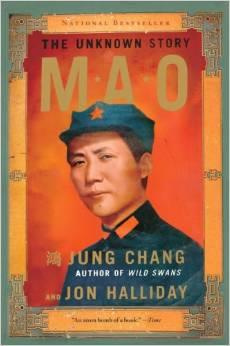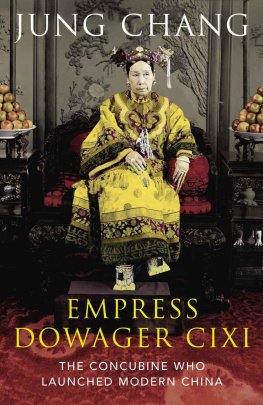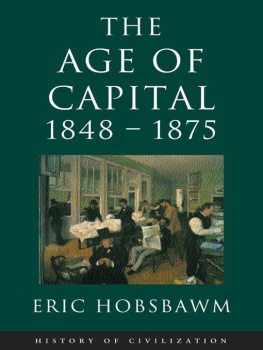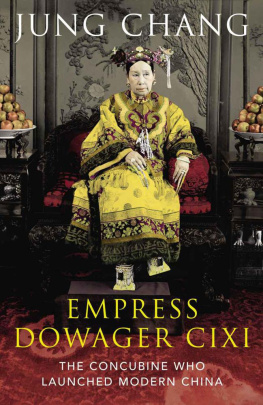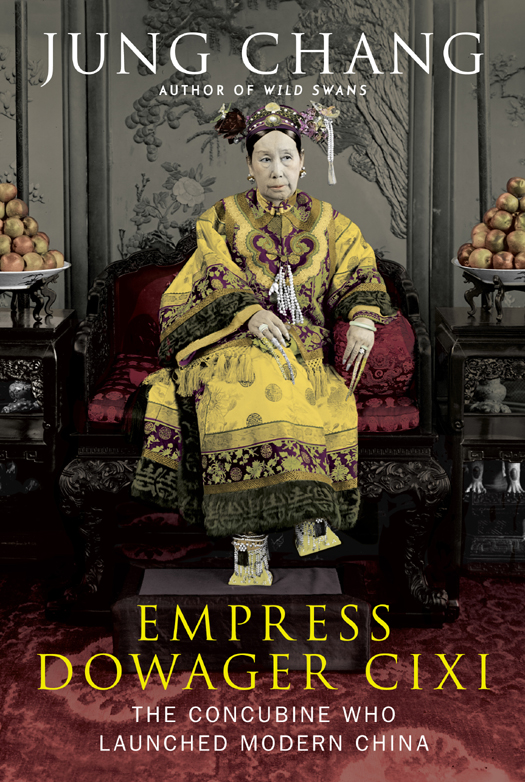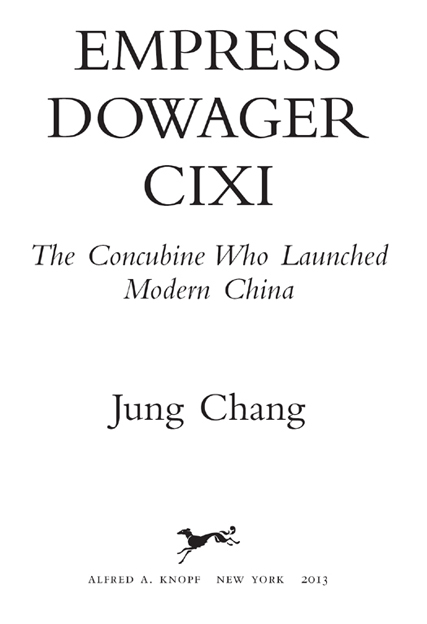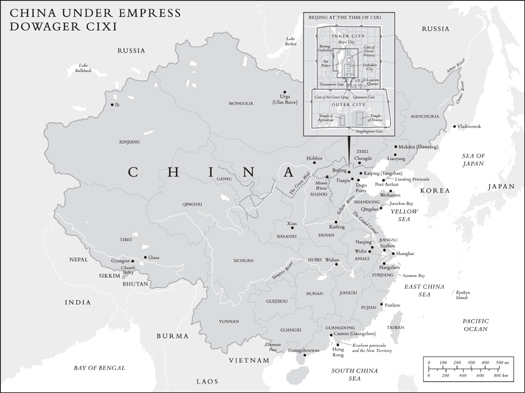THIS IS A BORZOI BOOK
PUBLISHED BY ALFRED A. KNOPF
Copyright 2013 by Globalflair Ltd.
All rights reserved. Published in the United States by Alfred A. Knopf,
a division of Random House LLC, New York, and in Canada by
Random House of Canada Limited, Toronto, Penguin Random House
Companies. Originally published in Great Britain by Jonathan Cape,
an imprint of The Random House Group, Limited, London.
www.aaknopf.com
Knopf, Borzoi Books, and the colophon are
registered trademarks of Random House LLC.
eBook ISBN: 978-0-385-35037-2
Library of Congress Cataloging-in-Publication Data [to come]
Chang, Jung, [date]
Empress Dowager Cixi : the concubine who launched
modern China / Jung Chang. First edition.
pages cm
Includes bibliographical references and index.
ISBN 978-0-307-27160-0 (hardcover)
1. Cixi, Empress dowager of China, 18351908. 2. Empresses
ChinaBiography. 3. ChinaPolitics and government19th century.
4. ChinaHistory18611912. I. Title.
DS 763.63. C 58 C 43 2013
9513.035092dc23 [ B ] 2013020766
Cover image: Cixi, Empress Dowager of China (detail), 18351908.
Freer Gallery of Art and Arthur M. Sackler Gallery Archives,
Smithsonian Institution, Washington, D.C. Purchase.
Photo: Xunling, neg. number SC-GR 254
Cover design by Suzanne Dean
Map by Darren Bennett
v3.1_r1
To Jon
List of Illustrations
Cixi dressed as Guanyin, the Goddess of Mercy.
Old Beijing Streets.
A caravan of camels passing in front of a Beijing city gate.
Cixi carried by eunuchs.
Prince Chun, who was married to Cixis sister.
Prince Gong, Cixis right-hand man.
Viceroy Zhang Zhidong.
Li Hongzhang (Earl Li) with Lord Salisbury and Lord Curzon.
General Yuan Shikai, later first President of the Republic of China.
Junglu entertaining Western visitors.
Anson Burlingame heads the first Chinese delegation to the West.
Charles Chinese Gordon.
Sarah Conger with Cixi and other ladies of the American Legation.
Sir Robert Hart with his Western band of Chinese musicians.
Painting by Cixi.
Panel showing Cixis calligraphy.
Painting and calligraphy by Emperor Xianfeng.
Cixi playing Go with a eunuch.
Airbrushed photograph of Cixi.
Portrait of Emperor Xianfeng.
Lootie, a Pekinese given to Queen Victoria.
Emperor Tongzhi as a child, playing with his half-sister.
Portrait of Emperor Guangxu.
Portrait of Empress Zhen.
The harem at the rear of the Forbidden City.
The front and main part of the Forbidden City on the occasion of Emperor Guangxus wedding.
The audience room in the Forbidden City.
The Summer Palace.
Portrait of Cixi by Katharine Carl.
Katharine Carl in Chinese costume.
Cixi in the snow with Louisa Pierson, Der Ling and Rongling.
Yu Keng, Louisa Pierson and family with Prince Zaizhen in Paris.
Rongling, the First Lady of modern dancing in China.
Hsingling dressed as Napoleon.
A Chinese courtesan.
Chinese children sent to America for education.
Pearl, Emperor Guangxus favourite concubine.
Grand Tutor Weng.
Cixi in a temple with Empress Longyu.
Sir Yinhuan Chang.
Kang Youwei.
Liang Qichao.
Japanese banknote showing It Hirobumi.
The Boxers in 1900.
Allied forces entering the Forbidden City.
Cixi waving to a foreign photographer.
Postcard of the imperial locomotive.
Girls with bound feet.
Convicts in cangues.
Cixi putting a flower in her hair.
Cixi smiling.
Cixi on a barge on the lake of the Sea Palace.
On a barge in opera costume.
Court ladies at the American Legation.
Sarah Congers courtyard.
Cixi in the snow with eunuchs and Der Ling.
Regent Zaifeng with the child Emperor Puyi.
Sun Yat-sen with soldiers.
Cixis funeral parade.
The Eastern Mausoleums of the Qing monarchs where Cixi was buried.
About the Sources
This book is based on historical documents, chiefly Chinese. They include imperial decrees, court records, official communications, personal correspondence, diaries and eye-witness accounts. Most of them have only come to light since the death of Mao in 1976, when historians were able to resume working on the archives. Thanks to their dedicated efforts, huge numbers of files have been sorted, studied, published, some even digitalised. Earlier publications of archive materials and scholarly works have been reissued. Thus I have had the good fortune to be able to utilise a colossal documentary pool, as well as consulting the First Historical Archives of China, the main keeper of the records to do with Empress Dowager Cixi, which holds twelve million documents. The vast majority of the sources cited have never been seen or used outside the Chinese-speaking world.
The Empress Dowagers Western contemporaries left valuable diaries, letters and memoirs. Queen Victorias diary, Hansard and the copious international diplomatic exchanges are all rich mines of information. The Archives of the Freer Gallery of Art and the Arthur M. Sackler Gallery, in Washington DC, is the only place that possesses the original negatives of the photographs of Cixi.
Authors Note
The tael was the currency of China at the time. One tael weighed about 38 grams and was valued at roughly a third of a pound sterling (1 = Tls. 3).
Chinese (and Japanese) personal names are given surname first, except for those who chose to render their names differently.
The pinyin system is used where transliteration is needed. Thus there are non-pinyin Chinese names, e.g. Canton, Tsinghua (University).
The dates and ages of people are given according to the Western system (which is used in China today). The exceptions are stated.
In the Bibliography, the publication dates are of the editions which this author consulted. Many very old books may therefore give the appearance of having been published quite recently.
Click for large image
PART ONE
The Imperial Concubine
in Stormy Times
(18351861)
1 Concubine to an Emperor
(183556)
I N spring 1852, in one of the periodic nationwide selections for imperial consorts, a sixteen-year-old girl caught the eye of the emperor and was chosen as a concubine. A Chinese emperor was entitled to one empress and as many concubines as he pleased. In the court registry she was entered simply as had fought her way to become the ruler of China, and for decades until her death in 1908 would hold in her hands the fate of nearly one-third of the worlds population. She was the Empress Dowager Cixi (also spelt Tzu Hsi). This was her honorific name and means kindly and joyous.
She came from one of the oldest and most illustrious Manchu families. The Manchus were a people who originally lived in Manchuria, beyond the Great Wall to the northeast. In 1644, the Ming dynasty in China was overthrown by a peasant rebellion, and the last Ming emperor hanged himself from a tree in the back garden of his palace. The Manchus seized the opportunity to smash across the Great Wall. They defeated the peasant rebels, occupied the whole of China and set up a new dynasty called the Great Qing Great Purity. Taking over the Ming capital, Beijing, as their own, the victorious Manchus went on to build an empire three times the size of the Ming empire, at its peak occupying a territory of 13 million square kilometres compared to 9.6 million today.


